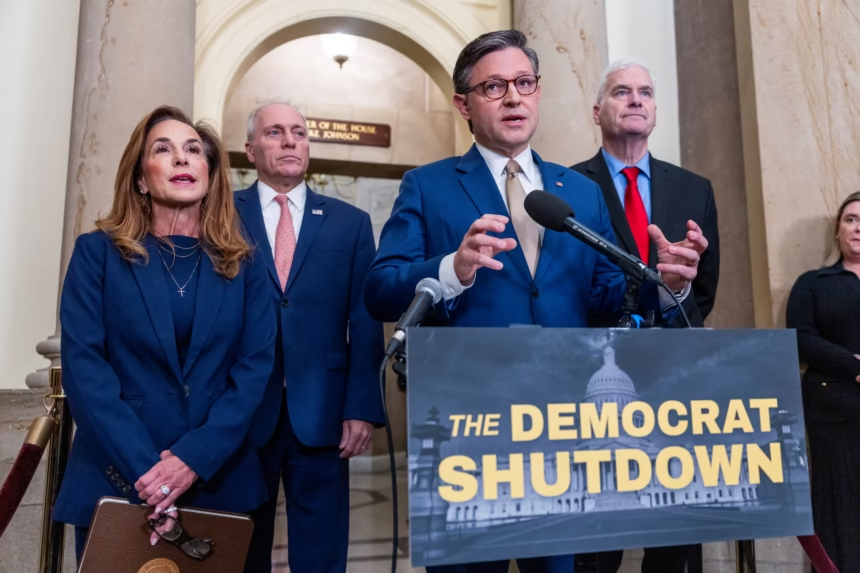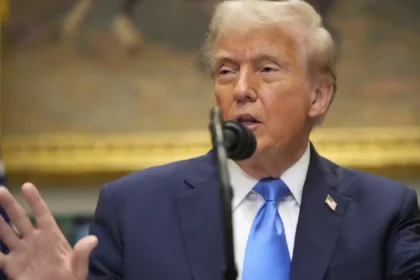As the U.S. government shutdown deepens, a controversial tactic has emerged: several federal agencies have altered their official communications—like out-of-office emails and website notifications—to place the blame directly on congressional Democrats. The move has triggered sharp criticism, with ethics experts warning it may cross legal lines under federal law.
How the Messaging Shift Happened
Reports from multiple federal employees indicate that automated out-of-office replies were changed—often without their knowledge—to include partisan claims that Democrats were responsible for the shutdown. In some cases, the original neutral messages, which merely informed senders of service interruptions, were replaced overnight with coded or direct accusations.
Similarly, agency websites began displaying banners and pop-up alerts attributing the shutdown to “Radical Left Democrats” or “Democrat-led obstruction.” Some messages accused Democrats of demanding concessions on healthcare, immigration, or social spending in exchange for reopening government.
Departments Involved & Scale
The communications changes were seen in multiple large departments, including Education, Agriculture, Housing, Health and Human Services, and others. In some cases, employees say the altered messages were pushed centrally—“provided by the Department”—rather than being voluntary edits by individual staffers.
In the Department of Education, one employee claimed the message change was implemented without staff consent: “We enabled the auto-reply before logging off. Later, the department went in and changed it, without telling us.” Many expressed concern about retaliation if they spoke publicly, given the partisan tones.
Legal & Ethical Stakes
Ethics experts and watchdogs warn that the messaging may violate the Hatch Act, a 1939 statute that prohibits federal employees from engaging in partisan political activity while on duty. The law is intended to preserve the neutrality of the civil service and prevent government resources from being used for political messaging.
In addition, the Anti-Lobbying Act and other restrictions on the use of federal funds for political communications may be implicated. Critics argue that taxpayer-funded websites, email infrastructure, and staff time should not be used to promote a party’s narrative.
Complaints have already been filed by ethics groups, demanding investigation and accountability. However, enforcement is complicated: the Office of Special Counsel, which typically investigates Hatch Act violations, is currently inactive due to the shutdown itself.
Political Reactions & Blame Game
Democrats quickly denounced the strategy. Representative Jamie Raskin warned that taxpayer-funded sites and communications had turned into propaganda tools serving the Trump administration’s agenda. He called the action “a naked violation” of the Hatch Act and an abuse of power.
House Democratic leadership accused Republicans of weaponizing government institutions and claimed this was part of a broader effort to control the narrative of the shutdown. Meanwhile, administration officials defended the messaging as factual commentary, not partisan activity, saying it aimed to clarify responsibility.
Impact on Public Trust
Many Americans depend on government websites and services for essential information—about benefits, regulations, and shutdown impacts. When those communication channels are repurposed as political battlegrounds, trust in federal institutions is threatened.
Some employees sought to revert to neutral replies, but reports suggest the messages were changed back. The tension puts civil servants in uncomfortable positions—expected to defend public service continuity while being used as channels for political messaging.
What’s Next
Investigations may proceed once oversight mechanisms resume. Congressional committees, inspectors general, or a reactivated Office of Special Counsel could review internal memos, email logs, and decisions behind the messaging orders.
Affected employees may request removal of partisan content or legal remedies if they were pressured into using it. Meanwhile, public backlash could force political accountability, especially if enforcement reveals senior officials directed or approved the communications shift.
In the larger picture, the episode underscores how quickly government institutions can switch from nonpartisan service to political instruments—and how fragile the boundary between state and party becomes in moments of crisis.











